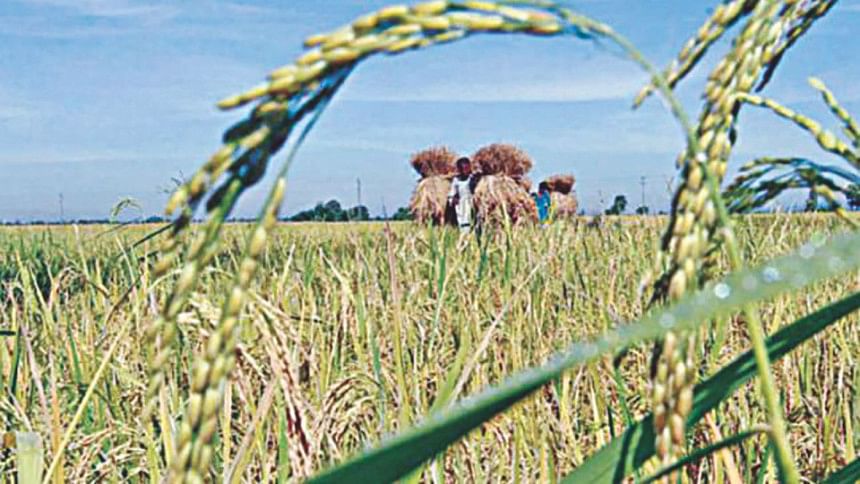Better managing our agricultural sector

Sustainable agro supply chain management includes a number of processes such as supply management, production management, and demand management to customers through a competitive distribution channel. For every step of the way can be linked with issues such as diversity of production and demand, largeness of produce, perishability, and seasonality.
Our agro business depends on a steady, high-quality supply of agricultural crops like rice, fish, vegetables, fruit, poultry, egg, wheat and many other supplies to make our food. However, our global food system is facing numerous challenges that are weighing down on individual farmers and the land they use.
In light of frequent fluctuations in prices of agricultural supplies in Bangladesh, the authorities every year respond to these price points similarly: ban exports, ban storage of the commodity by traders (through the essential produce performance) and try to contract other countries for imports. This puts the investor community in a quandary as any investment in modern supply chains involving cold storages, warehouses and processing facilities, would be reduced to naught if the authorities ban some kind of trading facility and activity. However, if no investments are made, trading facilities remain primitive and costs remain high in the supply chain.
These challenges are complex and call for solutions that require coordinated efforts by government, authority, industry, and scientific and environmental experts. Smallholder farming communities in particular need support to increase their resilience.
The situation obviously exposes the shortage of supply chain management space in Bangladesh, especially for the agriculture sector. The Bangladeshi agro supply chain system is defined by issues such as dominance of small/marginal farmers, fragmented supply chains, absence of scale economies, and low level of processing/value addition, inadequacy of marketing infrastructure and so on. As a result of falling back on old practices like forbidding exports, forbidding storage of supplies (through essential service performance) and increased imports of agro supplies each time there is a crisis, the authorities actually cause immense problems for people, as they ignore the structural deficiencies in the supply chain system, and instead focuses on short term solutions. They try to address the symptoms (crisis situation) rather than the sickness (issues plaguing the supply chain industry) itself.
The authorities often procure food grains in large quantities at a prearranged price to ensure a market for farmers. Regrettably, there is not enough storage facility available and large quantities of food grains are wasted in our country, ironically, when a large section of our population is left with an empty stomach. Thus, an unplanned concern of agro policy clearly is a disincentive to a section of investment in the modern supply chain concerning cold storages, warehouses and processing facilities, as the very purpose of such arrangements is to store fresh and fragile agricultural items for longer durations. It is time to think again about our management policy to make it more relevant for contemporary times. It is necessary for the concerned authorities to take a long-term view for the long-term gain of society, rather than be reluctant to reform due to perceived short-term pains. Development and modernisation in supply chain facilities will go a long way in reducing food waste and provide connectivity to consumers, who can then access food at more economical prices. This may also mitigate the consumers from food price fluctuations which has become the norm in the agricultural sector, while providing more competitive values to farmers for their harvest.
Sustainable agro supply chain management emerged from the remarkable shift of small producers in the demand driven chain. Having become more and more exposed to local, regional and world markets, they must mesh with the private sector and organise, invest in technology and comply with quality and safety standards.
By forming partnerships, stakeholders, small holders, retailers, processors, traders, etc, work together with agro producers and private sector organisations. Their transparent cooperation forms a delicate process of co-innovation, pilot studies, problem analysis, policy development and application.
A modern agro and well spread sustainable supply chain management infrastructure is not just helpful, it is, in fact, imperative considering the state of our agricultural sector. Given the many factors that can cause delays in deliverability, a well-designed and managed supply chain is essential. Those who can establish a distinctive supply chain and create it as a strategic asset are leaders in their respective sectors and businesses.
Taslim Ahammad, Assistant Professor, Bangabandhu Sheikh Mujibur Rahman Science and Technology University, Gopalganj, Bangladesh.
Email: [email protected]





Comments